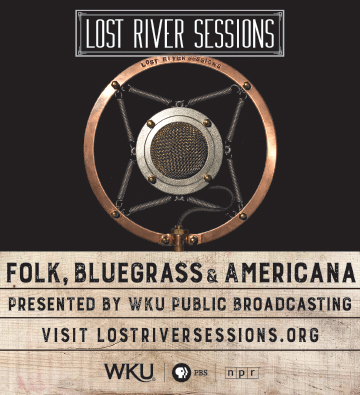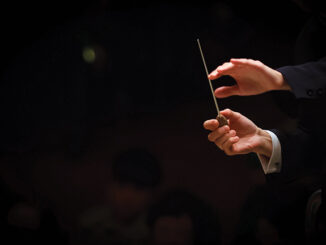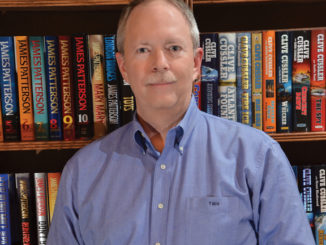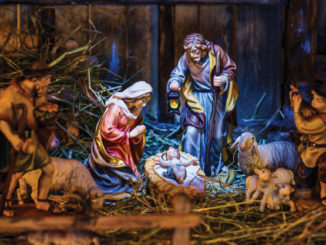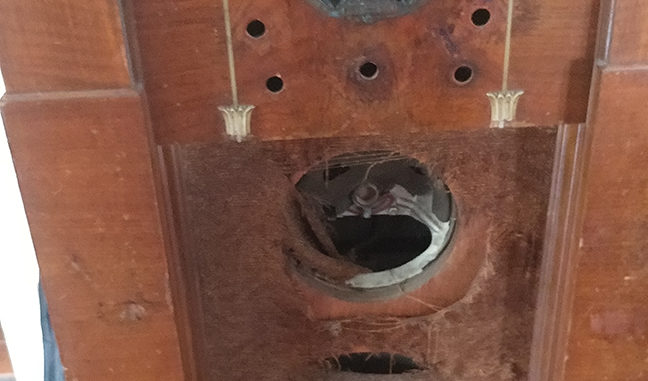
It was a fairly common if not typical January evening on the outskirts of Lincoln, in southeastern Nebraska. The air was cold and brittle, the atmosphere calm and clear. The moonlit snow sparkled on the frozen ground. Lincoln is near the geographic center of the United States. The geography and conditions were ideal.
It was 1942. The war on both the Axis and Pacific fronts, by all accounts, was going badly for the U.S. forces. My mother was sitting in her cushioned rocker, knitting and darning, listening intently to the radio, a floor model 1933 Silvertone, purchased at Sears & Roebuck.
With the latest Lincoln Journal and Star in his lap, my dad sat in the “easy chair” trying to find Gabriel Heater’s fifteen-minute nightly newscast, slowly moving the radio dial back and forth. After a minute of searching, through the noise of disjointed voices and music, hums and crackling static, emerged Heater’s familiar style. Would he bring some glimmer of hope?
Day after day it was the same thing. Another defeat. Another loss. Not a smidgen of good news anywhere. Some were calling for surrender. Some were demanding that FDR resign. Grim as things were looking for the United States and her allies in Europe, it was in the Pacific that the world was reeling by the Japanese juggernaut.
I was pretty oblivious to all of this; to the war effort, the Duration, and gas, rubber and a multiplicity of other essentials being rationed. I was aware of what was flying overhead, however, like those cool P-38s. After all, I was ten.
I was also fascinated by the radio in the house and what it was able to bring us. A split second after Gabriel Heater bade America his cheery “good night”, or immediately after whatever program Mother and Dad were listening to, I would race to the Silvertone and hunt for distant stations, identifying them by their call letters, like “WXYZ, ABC in Detroit” (that’s where “The Lone Ranger” came from).
Dad and Mother were irritated by this odd behavior. But there was KFI in Los Angeles and WOR in New York! As far as I was concerned we lived in the right place, near the geographic center of the country. Conditions were perfect.
Radio in 1942 provided needful diversion. It offered respite from the distress of war news. There was high drama, like “Lux Radio Theater” and “Screen Guild Players”; mystery, like “Suspense,” “Inner Sanctum Mystery” and “The FBI in Peace and War;” and lots of comedy, Bob Hope, “The Jack Benny Program” and “Fibber Magee & Molly.” Movie palaces went dark when “Amos & Andy” came on the air.
There was classical music – “The Bell Telephone Hour,” “The Firestone Hour,” the NBC Symphony broadcasts with Arturo Toscanini conducting, and, in season, live broadcasts from the Metropolitan Opera, hosted by the legendary Milton Cross.
In many respects we are experiencing a condition similar to 1942. A worldwide emergency has caused the cancellation or postponement of nearly every performing arts event scheduled for May. Yet there is one interesting similarity.
The outer art-deco cabinetry that once housed the Silvertone radio stands quietly in a corner of our home. Its hollow openings show where the volume, on-off switch and tuning knobs were. The two large speakers have been silent since 1981, but the twelve lifeless tubes that once made the whole thing run are still in place.
Like “The War Years,” radio as a medium is still there. It can still soothe, reassure and inspire. For those who appreciate classical music on the air, there are two places to go – 88.9 and 97.5 FM.
I entered commercial radio in 1952. My first on-air stint was at WCAR in Pontiac, Michigan, probably on the site of the old Silverdome. The music format was an odd mix of country and pop. In those days it was typical for the engineer to play all the music. I simply announced and read copy. Frank Sinatra, Johnny Cash and Jo Stafford came on breakable 78s. A few years later it was Detroit and classical. I was playing the records by then – they were all ”33-and-a-thirds” or “albums,”
In 1986 I started work as music director for Western’s Public Radio, then comprised of transmitters in Bowling Green and Somerset, and soon to include Henderson, Owensboro and Elizabethtown. It was an interesting time of tape decks and cart machines, eventually replaced by computers and “all things digital.”
WKU Classical 97.5 FM went on the air in April 2016. Every style period of classical music can be found around the clock at 97.5. The station recently expanded to include Glasgow in its coverage. Enjoy “Exploring Music,” “Sunday Baroque,” “Performance Today,” “Millennium of Music” the Met Opera in season, local “Stained Glass” recitals, concerts by the Chicago Symphony, the New York Philharmonic and Los Angeles Philharmonic, and a score of other cool shows. In addition, 88.9 FM continues to offer “From the Top,” “Pipe Dreams,” “Concierto” and “Classical 24” – evenings and overnight.
Like the dark days of 1942 and our Silvertone radio, we, in this uncertain time, have constant companions at 88.9 and 97.5 FM, two separate and distinct audio streams. And they come static-free.
by Lee Stott

